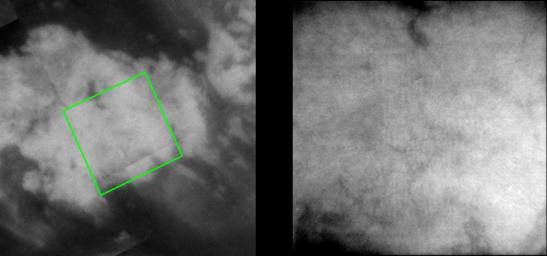It's hard not to speculate about the origins of the narrow, dark features seen in Cassini's new images of Titan's surface. They tantalize the viewer, resembling the dark channels seen elsewhere on Titan, but are just at the limits of resolution of the images (a few kilometers) -- too close to identify their true nature.
During the two most recent flybys of Titan, on March 31 and April 16, 2005, Cassini captured a number of images of the hemisphere of Titan that faces Saturn. The image at the left is taken from a mosaic of images obtained in March 2005 (see PIA06222) and shows the location of the frame at the right. The view at the right, taken during the most recent Titan flyby, shows a close-up of the eastern portion of a large, bright feature.
The resolution is somewhat degraded in this frame due to the low contrast of the terrain, but several narrow, dark and branching features, which are suggestive of channels, can be discerned.
The view at the left consists of five images that have been added together and enhanced to bring out surface detail and to reduce noise, though some camera artifacts remain.
These images were taken with the Cassini spacecraft narrow-angle camera using a filter sensitive to wavelengths of infrared light centered at 938 nanometers -- considered to be the imaging science subsystem's best spectral filter for observing the surface of Titan. This view was acquired from a distance of 40,000 kilometers (24,900 miles). The pixel scale of this image is 470 meters (0.3 miles) per pixel, although the actual resolution is likely to be several times larger.
The Cassini-Huygens mission is a cooperative project of NASA, the European Space Agency and the Italian Space Agency. The Jet Propulsion Laboratory, a division of the California Institute of Technology in Pasadena, manages the mission for NASA's Science Mission Directorate, Washington, D.C. The Cassini orbiter and its two onboard cameras were designed, developed and assembled at JPL. The imaging team is based at the Space Science Institute, Boulder, Colo.
For more information about the Cassini-Huygens mission visit http://saturn.jpl.nasa.gov. For additional images visit the Cassini imaging team homepage http://ciclops.org.

 Planetary Data System
Planetary Data System












